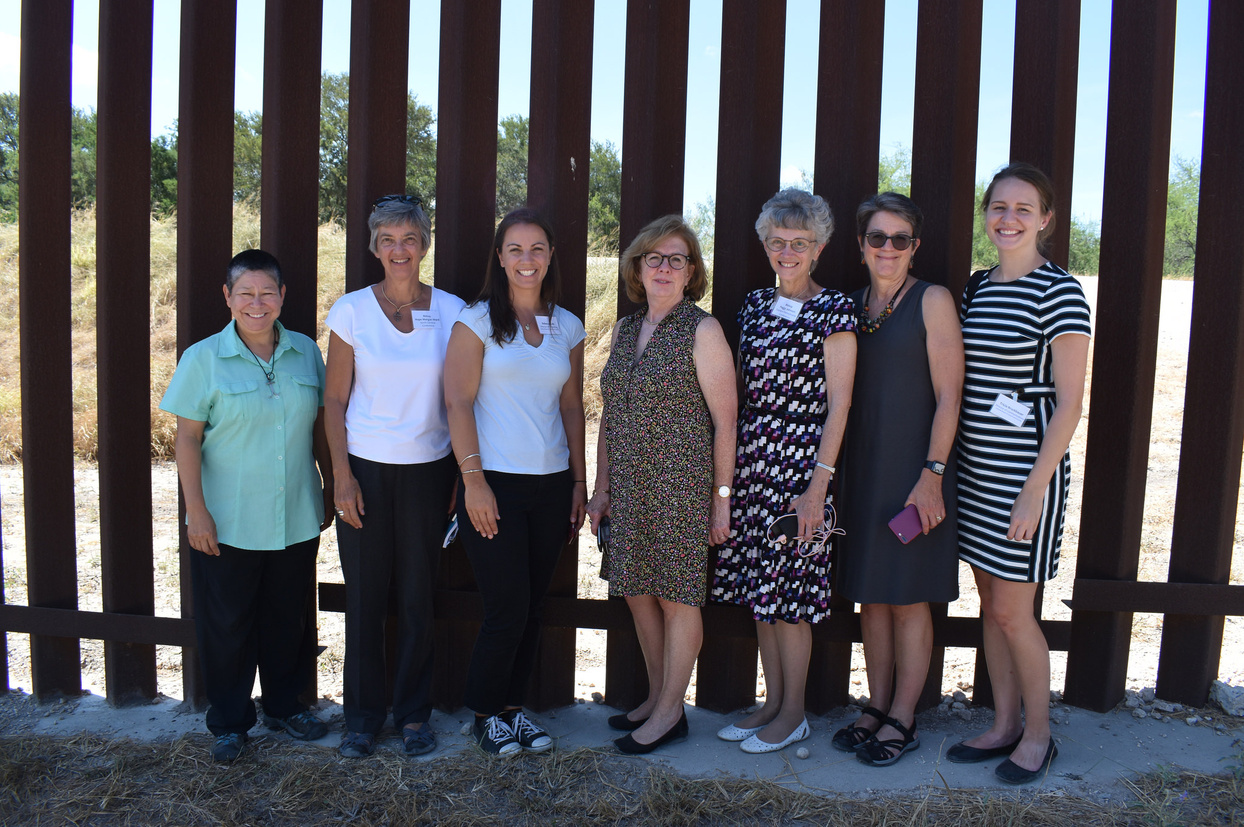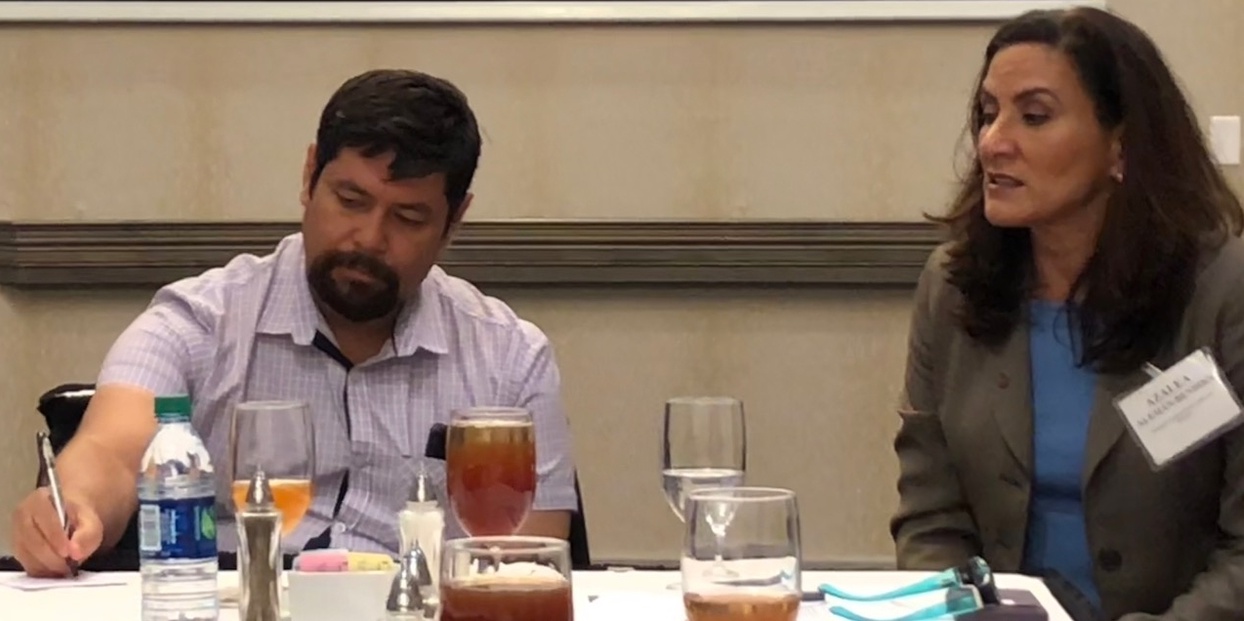Movement in the City, Melrose Park, Suffers Fire
A fire briefly burned in Movement in the City’s (new faith community) Melrose Park campus this morning. Firefighters, who rushed from a nearby station, quickly extinguished the…

BCS Board member Cindy Johnson (from Rio Conference), Bishop Hope Morgan Ward, GBCS staff member Rebecca Cole, GBCS General Secretary Susan Henry-Crowe, Bishop Peggy Johnson, Bishop Sally Dyck, and GBCS staff member Tricia Bruckbauer visit the the border of Mexico in August 2018.
At the end of August, I went to the border of Mexico at McAllen, TX with the General Board of Church and Society to witness, and to give witness, to the plight of those who are seeking asylum and refuge in the US from Mexico and Central America. A group of six—three GBCS staff and three bishops from the board—gathered with the resident bishop, Robert Schnase (who grew up and served churches along the border before being elected a bishop in 2004), and several others from the Rio Conference.
First we went to Anzalduas Park in Mission, TX overlooking the river where we met with several officers of the Border Control. These second generation Mexican-Americans shared with us about their work. They search out the river for those who are crossing it (a U.S. federal crime) by boat, horse, ATVs, and patrol cars. They talked about how it’s their job to track down those who are trying to make it across the river or through the high grass or trees. Usually when someone is apprehended by them, the first thing they ask for is water; some of them dying of dehydration. The Border Control takes the people they apprehend to the Ursula Processing Center.
In the Processing Center we saw hundreds of men, women and children. Mostly young adults with children; I don’t remember seeing many if any older people. Children older than 10 are separated from their parents in the Processing Center. They are all in big wire cages, lying on thin mattresses on the floor with space blankets made of mylar to keep warm in the heavily air-conditioned room which hummed with the sound of rustling space blankets. Other than that, there was very little noise. The officer said it was because they spend most of their time sleeping, finally resting after being on the run. Even children were very subdued. When those who spoke Spanish put their hand up to meet the hand of someone inside the cage, they would offer to pray for them. Tears would flow. They seemed more than physically tired.

Ephraim Guerrero, Attorney of the Eastern Conference of the Methodist Church of Mexico and Coordinator of Immigration Affairs in Monterrey, Mexico and Azalea Aleman-Bendix, Assistant Federal Public Defender, talked about the immigration situation from the Mexican side of the story. Photo courtesy of Sally Dyck.
Restroom facilities were in the middle of the cages where you could see the feet and often the head of anyone going into them for security reasons. Showers were off to the side. They were allowed to shower when they first got there. They were supplied with clean warm-up clothes while their own clothes were being washed and then returned to them.
Supposedly they only stay about three days before they are transported to a bus station or respite facility or their families give them tickets to a destination near them. The respite center that we visited was across from the bus station in McAllen. It began its work in 2015 when the city of McAllen was overrun with unaccompanied children. The respite center is far more inviting and lively. Here children came up to us as we sat, listening to Sister Norma, who runs it, and played with us. They were rambunctious but well-behaved; in the Processing Center they were lethargic and looked scared.
Across the street was the bus station where they would go when contact was made with family or friends and tickets were given. The respite center sent them on their way with whatever clothing items they needed, diapers, water and a sizable lunch. I can’t imagine how scary it must be to have a stack of bus tickets for the next couple of days and unable to read English.
Yet the journey through uncharted and sometimes dangerous waters doesn’t end when they arrive in Chicagoland (or anywhere else in the U.S.). They face the uncharted waters of a language they may not know or still struggle with.
But maybe all of this pales in the face of yet more uncharted and dangerous waters that people of color in our country face: the imposing and massive boulders of racism and prejudice. My family came to this country due to religious persecution, but we never had to worry about racism. As I’ve said before, what if our church had spent so much time, energy and resources addressing racism as we have homosexuality? Some might rightfully argue that our obsession with sexuality has in fact successfully diverted us from facing our racism.
In McAllen we were with a number of people whose work relates to immigration at the border, but perhaps the most impressive to me was at the Federal Courthouse where we met with Ms. Azalea Altman-Bendix, Assistant Federal Public Defender. And she’s United Methodist! She and her assistant told us how it is their job to defend and work to find a solution for those who have been apprehended at the river. In order to defend them and with the number of people they process, they have no more than one minute to talk with them before they go before a judge. We left Azalea and her assistant by praying for them and all those who come through their care.
The next day we met more people who work within the overwhelming effects of our broken immigration policies, seeing and caring for people who are the victims of it. Most of them are also people of faith, like Sister Norma and Azalea. I remembered the saying from Mister Rogers: when bad things happen, look for the people doing good.
You may know this journey of uncharted waters far better and more intimately than I do. Or you may disagree with what seems to you to be my opinion as I share what people who live and work there told us. But nothing seems more certain and true than our nation needs a better, more humane and compassionate immigration policy as we have had in other times in history.
Let us pray for those who are in such desperate situations of violence that they would leave their home, facing such obstacles. Let us pray for their families and friends back home and the countries they left that they might know peace and people wouldn’t have to leave home. Let us pray for our nation that it may truly be great and have a fair and humane immigration policy that benefits all of us, including those of us who rely on the work of immigrants on a daily basis.
Let us pray for our president and his administration, including Attorney General Jeff Sessions (a fellow United Methodist), that reason and compassion will provide motivation to work for a comprehensive immigration policy.
A fire briefly burned in Movement in the City’s (new faith community) Melrose Park campus this morning. Firefighters, who rushed from a nearby station, quickly extinguished the…
Christ United Methodist Church in Rockford suffered a fire on Monday night, Feb. 23, that started in its organ. Thanks to the fast response of the few in the building at the time, d…
For nearly a century, housing has been part of Humboldt Park United Methodist Church’s ministry. Now, through a partnership with LUCHA, the church’s 98-year-old building is being tran…
Reflecting on scripture and Building Beloved Community, Bishop Dan Schwerin contrasts God’s love-shaped authority with the fear-driven authoritarianism se…